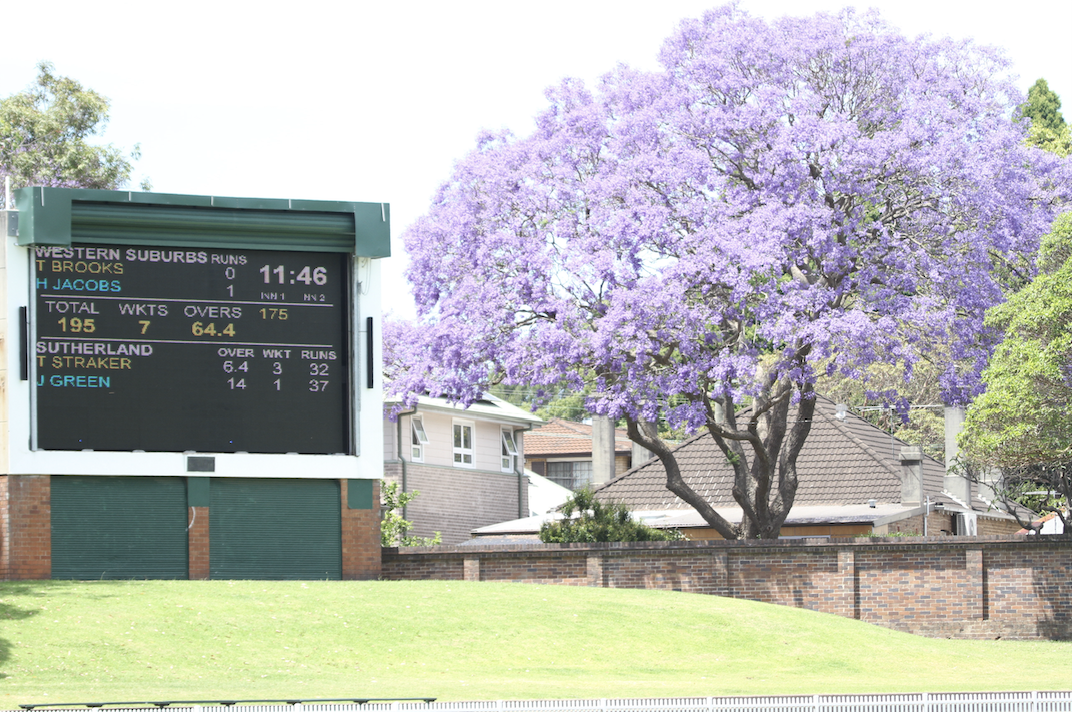Flair For Figures: A Western Suburbs District Cricket Club Tale
Western Suburbs District Cricket Club Sydney | December 31, 2024

The following article is an extract from our 2006 publication “Cricket in Black and White: 110 Not Out: The history of the Western Suburbs District Cricket Club”.
At the very front of the photograph of Burwood's successful First Grade team of 1903-04 sits, cross- legged, a distinctly nervous-looking schoolboy. He's wearing knickerbockers, long socks, a formal collar and a straw boater, and he looks as though he'd rather be anywhere else but sitting on the grass with a cricket team behind him. He's the scorer.
It's difficult to explain what motivates a person to spend the weekend entering numbers and dots in a cricket scorebook. Perhaps the best answer is that it's a way of being involved in the game, a way of becoming, almost, part of the team, that's available to those who love the game but can't actually play it all that well.
In the history of Western Suburbs, that stereotype fits the case often enough, although the boy in the photograph is an exception. His father, George Barbour, was the First Grade captain, and installed his son as scorer so that he could learn more about the game by watching and listening to the leading players in Sydney. It certainly did no harm: three years later, Eric Barbour joined his father in the team, and two years after that, while still a schoolboy, he made his debut for New South Wales.
?Chemist Warehouse Ashfield is a proud sponsor of Western Suburbs District Cricket Club
Eric Barbour turned out to be rather better at making runs than recording them; Len Davis, in contrast, never played cricket to any very exalted level. But he provided outstanding service to the Western Suburbs club, filling the position of First Grade scorer for 22 years. Oddly, in the formal photograph taken of the 1928-29 First Grade premiership team, Davis occupies exactly the same position as Eric Barbour did in 1903-04 - cross-legged on the ground at the feet of the captain. But Davis had a very different approach to the role of scorer. He expanded his role to include managing the First Grade team, and he served on the club's committee. He produced increasingly detailed statistical reports, and he was the first person to make any attempt at compiling records for the club. He was thorough, meticulous and accurate, and he was rewarded on several occasions with appointments to score in Sheffield Shield matches. Reg Herford wrote that:
Len Davis rendered magnificent service to the Club. His scorebooks were an object lesson to aspiring scorers, and his statistical reports a revelation to all. Having a natural flair for figures, Len never failed to provide individual players with progressive reports of averages, aggregates etc throughout the season. Prior to the start of each match, he would enter the dressing-room with a cheery word of welcome to all and a special handshake and word of encouragement for the newly-promoted player. He would then invariably proceed to distribute chewing-gum to the team.
Pictured above: Len Davis
Davis was elected a Life Member of the club in 1942-43, when he had completed twenty years of service to the First Grade team. Sadly, although he was still a relatively young man, he was dead within a year.
Davis was fastidiously neat; Alan Anderson was a burly bear of a man whose hopes of playing the game had been destroyed when he lost an arm. He scored for the successful Western Suburbs teams of the late 1950s and early 1960s, and like Davis acted as the team’s manager, collecting match fees and assisting with a wide range of tasks off the field. Anderson impressed Alan Davidson as "a real character", whose robust sense of humour always helped to keep the team cheerful.
Malcolm Gorham was a scorer more in the Len Davis mould. At the age of 13, "Pencil" began scoring for Western Suburbs' AW Green Shield and Poidevin-Gray Shield teams, and he graduated to First Grade in the premiership season of 1972-73, taking over the role from Anderson.
Gorham soon abandoned the constraints of traditional scorebooks, devising his own format for a scoresheet that enabled him to record the progress of a game in a far more detailed way. Like most scorers, he had his idiosyncrasies, including a habit of leaving the Pratten Park scorebox a couple of times a day to walk a lap of the ground - he insisted that he could do this and still keep a note of everything that happened on the field, although it often surprised visiting scorers the first time they saw him disappear. A banker, "Pencil" had a sound understanding of both numbers and money, and for several years he acted as the club's Treasurer as well as its statistician.
He surpassed Davis as the longest- serving Western Suburbs scorer, and was also made a Life Member of the club. In all, he scored in 554 Grade matches, 451 of them in First Grade. He also officiated in 17 minor representative matches, 21 State one-day matches, 24 first-class matches, 28 International one-day matches and five Test matches. And he scored, with a bat not a pencil, 2 First Grade runs. In the last match of 1973-74, a one- day repechage game against Central Cumberland, he was pressed into service as a player when one selected member of the team failed to arrive, and "Pencil" managed to push Cumberland's opening bowler through the off side for a couple of runs before losing his wicket.
Pictured above: Mal Gorham
Unhappily, like Len Davis, Malcolm Gorham died too young. He contracted Motor Neurone disease, which forced him to retire from scoring in 2003, and he died in February 2004, aged only 48. By an unhappy coincidence, only a month later, the same rare disease claimed the life of another Western Suburbs cricketer, Scott Gale. An outstanding junior cricketer, who excelled in the AW Green Shield team, Gale elected to pursue a career in Rugby League, playing 158 First Grade games for five different clubs; but he died in March 2004 at the tragically early age of 39.
"Pencil" was followed into the Pratten Park scoreboard by Steve McClue. As a boy, McClue had operated the old scoreboard at Pratten Park, a large and detailed structure that was modelled on the old Sydney Cricket Ground scoreboard. When that scoreboard went out of commission, Steve turned the numbers on the smaller board that replaced it, and began to assist in managing the First Grade team. He was a logical successor to Mal Gorham, and has embraced the role with the enthusiasm, diligence and attention to detail that have distinguished the outstanding Western Suburbs scorers of the past.
Footnote: As of 31 December 2024, Steve McClue remains the dedicated scorer for Western Suburbs' First Grade, Poidevin-Gray, and Green Shield teams. Over his remarkable tenure, he has recorded an extraordinary 889 games for the Western Suburbs District Cricket Club, exemplifying unwavering commitment and exceptional service to the sport.









